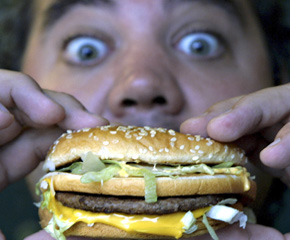You probably suffer from Binge Eating Disorder (BED). Also referred to as emotional eating, BED is defined as the habit of eating large quantities of food for emotional reasons, rather than hunger. BED sufferers have an unhealthy relationship with food. They eat faster than most people. They eat when they’re not hungry, they keep going until they’re overfull, and they end up not knowing what it feels like to be hungry.
According to Dr Doreen Virtue, an American psychologist, emotional eaters use food to fill an emotional gap. This gap can be anything – from unresolved trauma to being a victim of trying to be all things to all people.
While all of us sometimes eat for emotional reasons, a BED sufferer will try to quell the emotional hunger pains more than twice a week over a period of six weeks.
Research by the World Health Organisation ( WHO ) has shown that 78% of people who overeat do so for emotional reasons, and that 30 % of people who participate in weight-loss programmes, are emotional eaters.
Over time BED sufferers also battle to tell the difference between emotional hunger and the real thing.
Emotional hunger happens suddenly. It creeps up on you within seconds. Real hunger develops slowly – you become aware of it gradually. So if you feel hungry all of a sudden, it’s almost certainly due to an emotional trigger,’ says Dr Virtue.
She agrees that visualisation and meditation are useful to help determine what drives you to overeat. She advises that you spend a quiet evening thinking about your life. Consider what makes you feel angry, sad or frustrated.
Ask yourself: ‘Why do I console myself with food?’ She believes the answer will occur to you within 48 hours – while you’re sleeping or during the course of the next day.
You need to realise what it is that causes your emotional eating. Then start recognising those emotions rather than pacifying them with food.
10 Weight-loss tips
1. Keep a food diary and pinpoint your bad eating habits.
2. Add up all the additional things that you eat, you’ll notice that it’s a lot more than you think.
3. Do not get despondent if you fall off the wagon. Instead get back on and hold on tight.
4. Set short-term goals – that way the journey will seem easier and shorter.
5. Visualise yourself in a healthy body space and then write it down.
6. Acknowledge what makes you overeat. That is only way you can change it.
7. Get professional help if you cannot do it alone.
8. Do at least one thing to combat bad habits and cultivate healthy ones.
9. Don’t tell people you’re on a diet.
10. Do not reward yourself with food and stop thinking that food will make you feel better. Rather reward yourself with something substantial.

